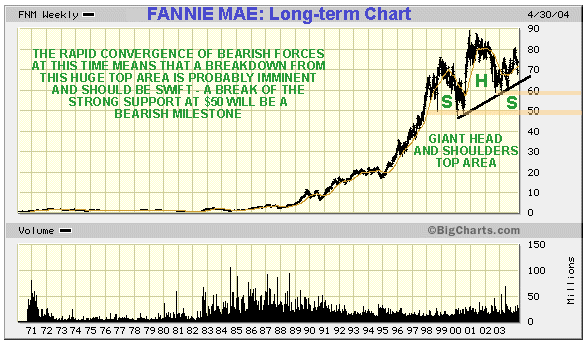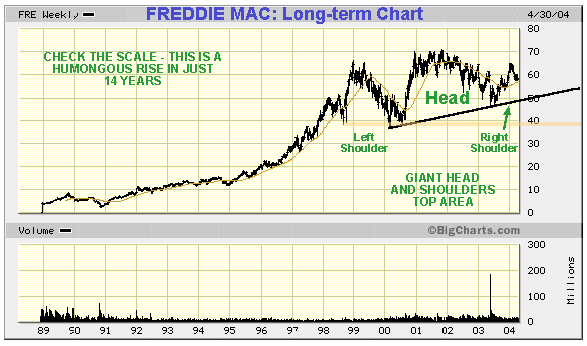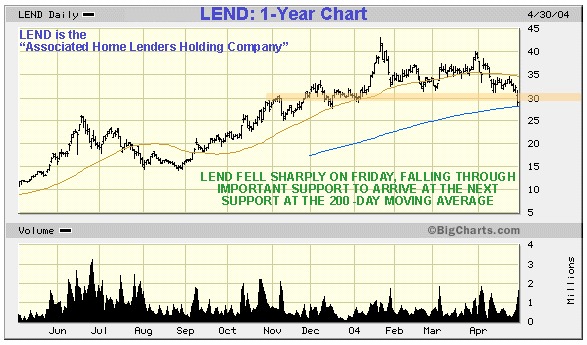 The Looming Property
Crash The Looming Property
Crash
Clive Maund
Written May 2, 2004
Posted May 10, 2004
In watching
the US property bubble expand to its final unsustainable extreme
over the past year or so, I have felt rather like that old guy
in the rocking chair in those Jack Daniels whisky ads, who whiles
away the time while the whisky matures reading the newspaper.
After about 15 years he slowly rises from his chair and shouts
"Jed - get the wagon!" The moment has arrived.
The time has
finally arrived for the US property market too, but unfortunately,
for most people, it will not be an occasion to celebrate. The
plunge in the bond markets and in the REITS (real estate investment
trusts) a few weeks ago signals that rising interest rates are
in the pipeline and are thus sounding the death knell for the
property boom. In particular, it is the alarming plunge in the
REIT index that has provoked me into writing this article.
Fundamentally,
there are a wide variety of factors that are set to exacerbate
the collapse in the property market. The most obvious of these
is the rampant, credit fuelled, highly leveraged and now maxed-out
speculation in property that is approaching its inevitable nemesis.
Most everyone associated with the property market have had a
glorious few years, and many people have been basking in the
glow of a treasure chest of unearned capital gains, and dipping
their paws into the honey pot of increased equity to rush out
and buy such essentials as flat screen cinema-sized TV's and
SUV's and avail themselves of the vast array of cheap goods made
in China, or on sale at Wal-Mart. Persons who would not normally
be considered credit-worthy have been encouraged to buy homes
with no down-payment whatsoever, and even, according to the half
hour infomercial by someone who goes by the name of Carlton Sheets,
that I happened to watch in the middle of the night in a hotel
in Philadelphia in February, while seriously jet-lagged, can
have it rigged so that they get $50,000 cash whacked into their
paw on conclusion of the deal. What a wonderful country, I thought,
people are actually lining up to give you money.
The US economy
has now become so distorted and abnormal, as a result of artificially
low interest rates and the resultant across the board explosion
of credit and pyramiding of derivatives, which have fuelled asset
bubbles, misallocation of resources and a continuation of massive
consumption, that it has become perilously unstable and vulnerable,
with the result that any significant rise in rates will lead
to an economic implosion.

If a severe
bear market in property is bearing down on us can it be seen
in the charts? - it most certainly can. We'll start by looking
at the long-term charts for Fannie Mae and Freddie Mac. On both
these charts we can see giant Head-and-Shoulders top areas approaching
completion. It is sobering to realize that these top areas started
to form way back in 1998, so the implications of them are very
far-reaching. More observant readers may spot that the left shoulders
of these patterns took over 2 years to form, and that, to be
symmetrical, the right shoulders could take another 6 months
or so to complete. Although this is true, I don't think it will
take anywhere near so long, because of the way the current situation
is deteriorating as signified by the action in the bonds and
REIT's charts. The really swift decline in these stocks will
occur when Fannie breaks below the important support around $48
and Freddie breaks below $38. Being still close to their highs
I consider both these stocks to be excellent candidates for put
options, even if they stay high for a while, necessitating rolling
forward into later expiries - although given the parlous state
of the general market, I don't think that will prove necessary.
I would expect these to decline steeply in tune with a general
market plunge.


The LEND chart
provides additional corroborative evidence of a weakening in
the housing sector. LEND is the "Associated Home Lenders
Holding Company". On the 1-year chart we can see that it
fell steeply last Friday, breaking support and dropping about
10%, and is now perched on lower support at the 200-day moving
average. Note the bearish high volume on this move.
On the long-term
REIT index chart it is easy to dismiss the plunge of recent weeks
as a correction, after all, on a larger scale the trend would
appear to still be up, and the decline did stop at the 200-day
moving average. But on closer inspection, by means of the 1-year
chart, we can readily appreciate how the sudden and severe plunge
from the fine steady uptrend in response to the scent of higher
interest rates has shattered confidence. It is interesting to
observe how the index has temporarily found support at the 200-day
moving average, which is normal, generated by those who do not
yet appreciate that "it's all over".
The formation
that has developed in the REIT index on the 200-day moving average
appears to be a downflag - implying that another sharp plunge
is brewing.
The developments
in these charts all point to a severe bear market in property
in the US, and it is no coincidence that bonds and stock indices
are also looking very sick at this time, as an across the board
meltdown begins to unfold.
I am aware
that a large percentage of my readers are US citizens, a good
many of whom are likely to be adversely affected by these developments,
and am, therefore, endeavouring to assess these developments
calmly and rationally, without descending into the realms of
alarmist fantasy. I take the view that many readers would rather
gain an insight into what is likely to happen before it happens,
the better to protect themselves and their families, than live
in a fool's paradise and find out at much greater cost, after
the event.
In any case,
appropriate defensive action will depend entirely on the personal
circumstances of the individual. If you are perfectly happy in
the house in which you live, if it is a real home, then you have
quality of life, and in a sense it is irrelevant whether your
house is worth $15 or $500,000. Appropriate action for you would
probably be to pay down debt to ensure that if, in the coming
recession/depression, you get kicked out of your job, you won't
also end up being booted out of your home. On the other hand,
if you have additional discretionary property, such as a second
and maybe a third house, I believe you would be very wise to
take of advantage of the fabulous, insane prices currently on
offer and cash in, in the knowledge that you can buy back a similar
property for perhaps half the price, maybe less, in a few years.
Property speculators in particular would be very wise to cash
in their chips now, in my opinion. Homeowners who are undecided
about a potential move, perhaps due to having neighbours like
the Osbournes, would probably do well to rent for a while and
then move in to buy a really nice place after prices have plunged.
The rot has
already set in in a good many states, where state budgets are
under severe pressure, unemployment is rising and property prices
are falling, or about to fall as prices stick, buyers evaporate
and a forest of "for sale" boards appears.
The crash in
US markets and in particular the US property market will, of
course, have global repercussions. Two countries that will be
particularly badly affected will be Australia and the UK. Speculation
in property in Australia has been rampant driving prices to giddy
heights, but at least you get something for your money there.
The same is not true of Britain, which seems to specialize in
what I call "rabbit hutch" housing - unimaginative,
poorly constructed, overpriced boxes. Don't get me wrong - there
are nice houses in Britain, just be prepared to pay a huge sum
if you want one.
May 2, 2004
Clive Maund
Clive.Maund@t-online.de
Clive
Maund is an English technical analyst, holding a diploma from
the Society of Technical Analysts, Cambridge and living
in southern Bavaria, Germany.
Visit his
website at clivemaund.com.
No responsibility
can be accepted for losses that may result as a consequence of
trading on the basis of this analysis.
Copyright
© CliveMaund 2004. All Rights Reserved.
______________
reprinted
at 321gold Inc

|